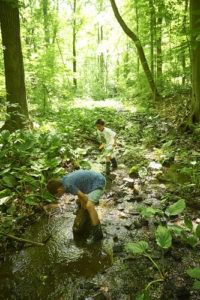Summer Skill Building with Your Child

With summer on the horizon, it is a great time for parents, guardians, and caregivers to think about the social-emotional skills that they would like to foster in their child. To begin your thinking, here are a few ideas, skills, and strategies that we use in Westtown’s Lower School.
Unstructured, unguided, and unplugged free play time: Providing children with the time to play without electronics is critical for fostering imagination, problem-solving, and resilience. Children today have access to a plethora of immediately gratifying, hyper-stimulating forms of entertainment such as on-demand television shows, video games, cell phones, iPads, etc. While this form of entertainment can be fun and enjoyable, it takes away from time that can be spent fostering skills such as focus, exploration, engagement, and problem-solving without the stimulation of the device. These skills are critical for success in school. As the summer approaches, think about how you can carve out time every day for your child to have unstructured, unguided, and unplugged free time. This may become one of their favorite times of day (and yours!).
Problem-Solving Skills: What an important skill this is! When teaching children to solve a problem on their own, there are a sequence of steps that you can explicitly teach them:
Step 1: Identify the problem – “Can you tell me exactly what the problem is?”
This can be the most difficult step, as children tend to see problems from only their point of view. Parents can help by asking questions about the situation, what was happening before the problem happened, and who else is involved. This guided thought process can help the child to narrow the problem down to something that is specific enough to solve.
Step 2: Brainstorm all the possible solutions – “What are all the ways that you could respond?” In this step, help your child think of all the possible solutions to the problem – even the unrealistic or silly ones. This is a critical step, as it helps your child to think flexibly and generate ideas.
Step 3: Think about the outcome of each – “What will happen if you chose this one?” In this step, ask your child to picture what will happen if they chose each option. This step fosters forethought, which is necessary for planning, impulse control, and other life-long executive function skills. Cross out each solution that will not have the desired or optimal outcome as you go.
Step 4: Make your choice – “Which solution will you try?” Have your child select the option that is best from the list, and ask them to explain why they chose it.
Step 5: Try it – “Give it a try and let’s see how it goes.” After your child follows through on the option, talk with them to see how the events played out. Would they have made that same choice again? If not, would they have made a different choice? This step fosters self-reflection, and again, forethought for problems that have yet to arise.
- Coping Skills: When emotions are high, it is hard to engage the thinking part of your brain. As a result, many actions and reactions can be unexpected because they are driven by emotion. Supporting your child in developing a habit of stopping to take a breath before acting can be very effective. We often use a breathing technique at Westtown known as the 5-4-7. The 5-4-7 is a structured breathing exercise. You begin by breathing in for a count of 5, then hold your breath for a count of 4, and finally exhale for a count of 7. Repeat as needed!
Social-emotional skills help our children navigate everyday life and the more we can partner at home and in school to develop these skills the better. Have fun with it and enjoy the summer months!



